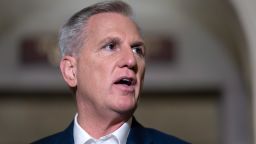House Freedom Caucus member Rep. Ken Buck criticized the bipartisan debt ceiling deal reached between House Republicans and the White House as a “Democratic bill,” and said his hard-line, conservative group had “failed” in its efforts to influence legislation more to its liking.
The caucus “still retains a lot of influence in the House,” the Colorado Republican told CNN’s Dana Bash on “State of the Union” on Sunday. “The key is that we use that influence in a way that brings conservative results. And I think that that’s what we tried to do with this case, and we failed, honestly.”
“This bill is a Democrat bill. It is a bill that not only avoided a default but also locked in the progressive gains that the president made in the last two years,” he added.
President Joe Biden signed into law Saturday the legislation to suspend the nation’s debt limit through January 1, 2025, helping avert a first-ever US default. The deal has faced backlash from conservatives and progressives but ultimately won support from a wide array of lawmakers on both sides of the aisle, many of them moderates.
House Speaker Kevin McCarthy said Sunday he felt good about Biden signing the agreement “because we’re finally spending less than we spent the year before.”
“We actually got more than you thought in the process you could get at this point,” McCarthy, a California Republican, told Fox News.
Meanwhile, in a separate interview on “State of the Union,” White House budget chief Shalanda Young, a top debt ceiling negotiator, declined to call the new law an outright win for the Democrats despite suggestions from some in the party that they downplayed their initial approval of the bill to garner more Republican support.
“At the end of the day, the long view, the short and the medium view is default was not an option. So, not who can win,” Young told Bash when asked about a Democratic congressman saying his party had “rolled” Republicans.
“I have done this a long time, and we had to talk about the budget at some point this year. And this is about what you would expect to see out of a budget agreement with divided Congress,” Young said.
McCarthy’s speakership
Buck said Sunday that while he believes McCarthy has credibility issues following passage of the debt ceiling deal, he’s not sure a vote to oust the California Republican from his speakership – also known as a “motion to vacate” – would happen “right away.”
“We continue to see the swamp, the folks in Washington, DC, who want to spend more money, winning, and we continue to see the folks who want to spend less money and really act responsibly losing. And so I think that Kevin McCarthy has an issue in a broader sense,” Buck said.
Among the concessions agreed to by McCarthy to secure his speakership earlier this year was that any member can call for a motion to vacate the speaker’s chair, making it easier to trigger what is effectively a no-confidence vote in the speaker.
When asked by Bash what would lead him and his colleagues to employ such a move, Buck said that was something that should be done with “consensus” in the House Republican Conference.
“I don’t think it can be used by just a few people,” he said. “I applaud Kevin McCarthy for saying he wants to bring people back together again. Let’s see if he does that in a way that involves spending responsibly in the future.”
CNN has previously reported that while some of McCarthy’s fiercest critics have had private discussions about the motion to vacate, there is less appetite among the Freedom Caucus as a whole to go that route with the group’s chairman calling it “premature” in a caucus call earlier this week.
CNN’s Andrew Millman and Jasmine Wright contributed to this report.







